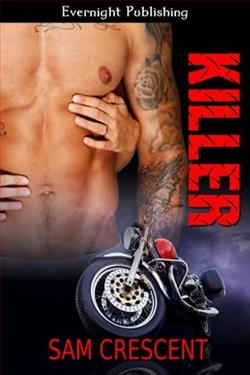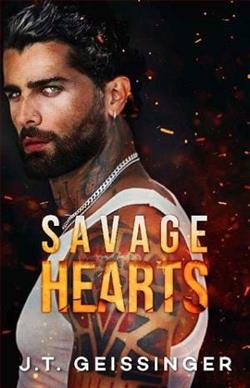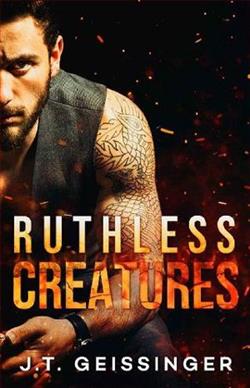Page 122 of Wicked Beautiful (Wicked Games 1)
Frowning, Connor looks back and forth between the two stunned women. “What?”
After a long, excruciating pause, Darcy stands slowly, as if it pains her to move, walks to the counter and grabs a crystal decanter of scotch. She turns back and looks at me.
What I see in her eyes gives me the willies.
“I think it’s time for you to get that strong-ass drink, Parker. You’re gonna need it.”
THIRTY-SEVEN
~ Victoria ~
Mexico.
I visited once when I was little on a trip with my father to his hometown. I loved the color and the noise and the people, the happy, chattering people, who all looked just like me.
I’ve never forgotten the feeling I had as a child, stuffing my face with antojitos from a street vendor as I walked by my father’s side on our way to the church where the grandfather I’d never met was displayed in a coffin draped with a Mexican flag, surrounded by bouquets of white roses and wailing women in black lace veils.
I felt as if I’d finally come home.
I belonged in that exotic land of life and splendor with its pungent smells, tangled streets, gridlock and pollution. Mexico City should have been overwhelming for a small child, but somehow it felt freer to me than all the wide-open spaces of Texas. Somehow I felt less a stranger in a country I’d never set foot in than in the town where I grew up.
So it seemed like a good place to open the third act in the tragicomedy play of my life.
It took three days to get to Miami from St. Thomas. Three hellish days of sailing rough Atlantic waters with a grizzled old captain from Barbados who looked as if he’d been born at sea. He had a ragged white beard and skin the color of midnight, and only smiled once, when I bribed him for a ride with my Rolex. He started drinking rum at six a.m. with his coffee, and didn’t stop until he passed out when the sun went down.
The first night I’d been terrified, convinced the boat would capsize or run aground while the captain slept, but apparently its navigational system was sound because we never ran into trouble. After that, I felt more comfortable about the trip but was plagued by thoughts of discovery. I’d been careful to take only half the cash in my wallet, careful to fling the extra shirt and skirt I’d donned over my jeans into the sea, careful to stay out of sight on the winding, rain-swept road that led from Casa de la Verdad to the port. I’d arrived soaked and shivering at five in the morning and went straight to the big catamaran I’d noticed on the trip in, the one that had a sign on its jib that read, “Charter Me.”
Luckily, Captain Stone Face woke up as early as he passed out. He was on deck when I approached, eyeing me warily. I told him my name was June and my husband had tried to kill me so I needed safe passage off the islands, but all he cared about was the timepiece on my wrist, a chunk of rose gold glittering with diamonds.
I figured it was a small price to pay to avoid jail. I gave it to him after making sure he understood that if he pawned it, he’d say he found it washed up on the shore. He said he didn’t care if I wanted him to say it arrived from outer space, and he knew how to keep his mouth shut anyway.
I got the feeling I wasn’t the first person to pay for a charter with unusual means.
From Miami I took a Greyhound to the main bus terminal in Newark, New Jersey, where I then hired a cab—with the last of the money from my wallet—to take me to the storage locker I’d rented nearby. I had a change of clothing along with other necessities in the large duffel bag I’d stashed there years before in case of an emergency like this one. Thankfully I hadn’t gained any weight; the clothes smelled a bit musty, but they still fit.
I should’ve sealed them in vacuum-packed plastic
like I did the cash.
I’d already hacked off all my hair on the boat, but then bleached it with peroxide in a grungy gas station bathroom before I rented a car and got on I-40, headed west. My fake driver’s license and passport photos showed me bespectacled, wearing a short blonde wig, so I picked up a pair of cheap reading glasses at a convenience store. I arrived at the US/Mexico border in Brownsville, Texas, after another three days of driving.
And then I paid a small toll to a sweating immigration agent and walked across a bridge into my new life.
Well, the toll was small. The wad of cash I pressed into his hand so he wouldn’t search my lumpy duffel bag was not.
Now, a week after I left the Caribbean, I’m sitting on a rented sofa in a rented room in Mexico in the wee hours of the morning, watching my rented black-and-white television. It’s tuned to an American news station, which features a story about the tragic death of one Victoria Price, author and celebrity hand-holder—and celebrity in her own right—who, according to her suicide note, decided to take her own life after being diagnosed with terminal pancreatic cancer. The perky news anchor is trying desperately to appear solemn, but her mouth keeps breaking into a toothy smile.
A celebrity’s death is always good business for the news industry.
“After an exhaustive search, the body still hasn’t been found,” says the anchor, blue eyes twinkling. “Officials have stated it’s possible that it will never be recovered. The storm that hit St. Thomas the evening of Ms. Price’s disappearance was strong, and her remains may have washed far out to sea. For now the case remains officially open as that of a missing person, but inside sources say the authorities have found no evidence of foul play, and they are convinced it is indeed a suicide, in spite of the lack of identifiable remains.
“Parker Maxwell, owner of the home Ms. Price was staying in, and her rumored lover, has refused to speak with the press, but Luciano Mancari, star of the popular television cooking show Mangia with Mancari, and another rumored lover of Ms. Price’s, has given several passionate interviews wherein he has challenged Mr. Maxwell to a duel, of all things, for what Mr. Mancari insists is his alleged rival’s part in Ms. Price’s disappearance. No word yet from the Maxwell camp if they’ll accept the challenge, or file a lawsuit for slander. We’ll return after this.”
The station breaks for a commercial. When they return, the beaming blonde anchor moves on to a story about global warming.
So there you have it: I’m dead.
It’s funny how easy dying is.















